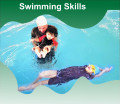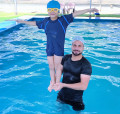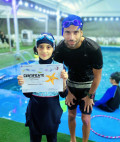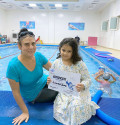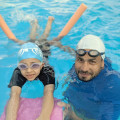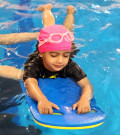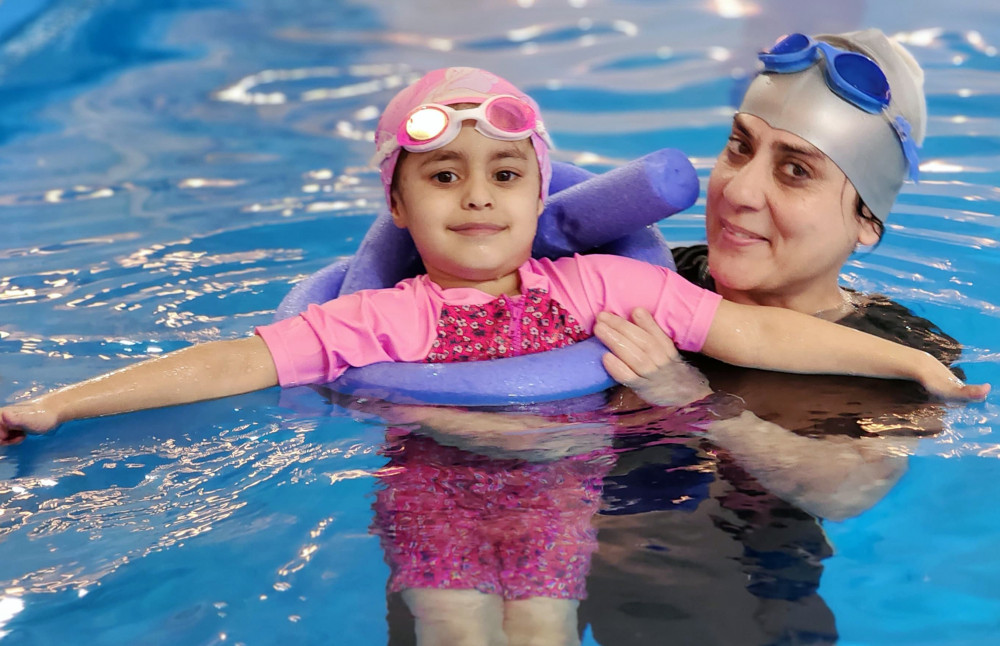
Regular swimming sessions contribute to overall physical fitness
2024-02-28 - swimmingIntroduction
Swimming is not just a recreational activity; it is a
life-saving skill and an excellent form of exercise. Encouraging kids to swim
from a young age not only ensures their safety around water but also offers a
plethora of physical, mental, and social benefits. In this article, we'll
explore why it's essential to encourage kids to swim and how it can lead to
easy earning, not just in terms of financial gains but also in lifelong skills
and well-being.
Physical Health Benefits
Swimming offers a full-body workout, making it an ideal
activity for kids to stay active and healthy. It improves cardiovascular health
by strengthening the heart and lungs, enhances muscle strength and
coordination, and boosts flexibility and stamina. Regular swimming sessions
contribute to overall physical fitness and can help prevent obesity and related
health issues in children.
Mental Health Benefits
In addition to physical health, swimming has numerous mental
health benefits for kids. It acts as a stress-reliever, providing a sense of
relaxation and tranquility. Swimming also builds confidence and self-esteem as
children learn new skills and overcome challenges in the water. Moreover, it
promotes a positive mood and reduces symptoms of anxiety and depression,
contributing to overall well-being.
Social Benefits
Swimming provides ample opportunities for social interaction
and skill development. Kids can meet and interact with peers in swim classes or
on swim teams, fostering friendships and a sense of belonging. Moreover,
swimming teaches teamwork, cooperation, and effective communication, essential
skills that benefit children both in and out of the water.
Safety Skills
One of the most critical reasons for encouraging kids to
swim is to teach them essential water safety skills. Drowning is a leading
cause of accidental death in children, and learning to swim significantly
reduces the risk of drowning accidents. Swim lessons teach children how to stay
safe in and around water, including basic survival techniques and rescue
strategies, ensuring their safety in various aquatic environments.
Financial Benefits
Apart from the health and safety aspects, encouraging kids
to swim can also lead to financial benefits in the long run. Children who excel
in swimming may have opportunities for scholarships and grants in competitive
swimming, easing the financial burden of higher education. Additionally, the
aquatics industry offers various career paths, such as lifeguarding, coaching,
or aquatic therapy, providing potential sources of income for skilled swimmers.
Tips for Encouraging Kids to Swim
When encouraging kids to swim, it's essential to make the
experience enjoyable and rewarding. Start early with swim lessons, make it fun
with games and activities, and provide plenty of positive reinforcement and
encouragement. Lead by example by demonstrating your enthusiasm for swimming
and create a supportive environment where kids feel safe to learn and explore
in the water.
Overcoming Challenges
While some children may take to swimming naturally, others
may face challenges such as fear of water or reluctance to participate. It's
essential to address these challenges with patience and understanding,
gradually exposing children to water in a controlled and supportive manner.
Seek professional guidance if needed, and never force a child into activities
they're uncomfortable with.
Creating a Supportive Environment
Encouraging family involvement and participation can enhance
the swimming experience for kids. Plan family outings to the pool or beach,
enroll in parent-child swim classes, and engage in water-related activities
together. By fostering a love for water activities within the family, children
are more likely to develop a positive attitude towards swimming.
Setting Realistic Goals
Set achievable goals for your child's swimming progress and
celebrate their accomplishments along the way. Whether it's mastering a new
stroke or swimming a certain distance, acknowledge their efforts and encourage
them to keep improving. Emphasize the importance of perseverance and
resilience, and remind children that progress takes time and practice.
Building Confidence and Trust
Building confidence in the water is crucial for children's
swimming development. Provide plenty of encouragement and reassurance, and
avoid putting pressure on them to perform. Allow kids to learn at their own
pace and provide opportunities for them to practice skills in a safe and
supportive environment. By instilling confidence and trust, children can
overcome fears and become competent swimmers.
Promoting Lifelong Skills
Swimming is not just a skill for childhood but a lifelong
activity that promotes health and well-being. By encouraging kids to swim,
parents are instilling lifelong fitness habits and a love for outdoor
activities. Moreover, swimming equips children with essential life skills such
as water safety, resilience, and discipline, which will serve them well into
adulthood.







.jpg)




































































